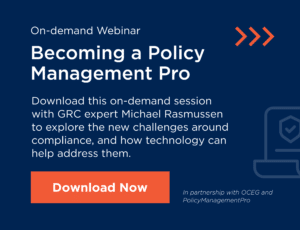As the world begins to return to normal, senior executives are taking stock of what their priorities are now, and where they need to focus their time and energy to maximum effect.
Part of our Becoming a Policy Management Pro series
The last 18 months have involved profound change, change that will have reverberating impacts on corporate cultures and compliance for years to come…reverberations that may well be permanent.
Michael Rasmussen, an industry-leading analyst at GRC 20/20 Research, recently explored some areas where companies are focusing their efforts during a special roundtable session at Interact IMEA.
 Environmental, Social & Governance (ESG)
Environmental, Social & Governance (ESG)
ESG is the area where there has been the greatest cultural change in recent years, as consumers and staff increasingly prioritize the corporate values of companies they buy from, or work for, alongside the services or products they offer.
The change is reflected in the growth of brand valuations on many balance sheets, attracting the focus of management, shareholders, and investors. Issues around sustainability and climate change, as well as diversity, human rights, animal welfare, consumer protection, and management, and staff remuneration can have a significant impact on the perception and valuation of a business.
Companies increasingly need to have clearly defined policies, positions and metrics on these issues and show that they support these positions in a meaningful way.
Changes to the business – whether mergers, acquisition, disposals, or new working practices like hybrid working – need to be reviewed through the prism of ESG, to assess their impact and to help with decision-making. ESG metrics increasingly form part of GRC management frameworks, so that senior management can be alerted about potential ESG issues swiftly.
 Building a Culture of Integrity
Building a Culture of Integrity
Acting with integrity underpins the ESG agenda. Consumers and decision makers increasingly expect organizations to ‘walk the walk’, not just ‘talk the talk’ about their values. It means some consumers, though not necessarily all, are comfortable with companies taking political stances, especially in relation to issues like human rights, climate change, pollution, mineral resource extraction, aboriginal rights, and other touchstone issues.
These issues will likely influence which companies organizations choose to include in their supply chain too. Companies are also expected to be good corporate citizens, contributing socially and economically to the local region.
Companies need to ensure that their staff members are aware of these positions and apply the values where appropriate, as part of their BAU.
 Regulatory compliance
Regulatory compliance
Regulatory compliance remains a key management issue. The growing complexity of regulations, of businesses themselves, and of issues like ESG means that the pressures to proactively manage the compliance picture in a business has never been more acute. Balancing all the conflicting demands, while still managing a profitable business demands skill, experience and constant visibility of compliance issues and metrics.
 Managing external risks
Managing external risks
Companies need to remain skilled at monitoring external risks, as part of their GRC regime. 2020 demonstrated how interconnected the world is, and how an issue in one part of the world can swiftly spread elsewhere. Technology and social changes – for example hybrid working or home shopping – are combining to disrupt BAU at an unprecedented rate. These changes can provide opportunity for some but can be particularly challenging for others. They need to be monitored carefully.
The supply chain can also be a source of significant risk for businesses, with issues swiftly making their presence felt when they happen. Changing work patterns have highlighted security and technology risks, that can expose any organisation to myriad issues, via its supply chain. There is significant value in being able to proactively monitor the operational, technical, and commercial issues facing suppliers, so companies can identify and fix problems early, even with suppliers in the 4th and 5th tier supply chains.
 Managing internal risk and business change
Managing internal risk and business change
Companies also have their own risk profile to manage. The greatest risks come from business change, and many businesses are now embarking on the greatest change in work seen in a generation – the introduction of hybrid working. While offering much valued flexibility for management and staff, the operational, technical, regulatory, and contractual risks are non-trivial and need to be identified, captured, and managed.
We’ve included these five areas in a free infographic you can download and share.
Mitratech offers a range of risk management and governance solutions that help organizations capture and control their risks more effectively, both within their business and throughout their supply chain. The solutions cover areas including policy management, compliance management, Shadow IT management and third-party risk management. These solutions are not only robust, but proven in practice by some of the most demanding companies in the world. Here’s where to learn more.



